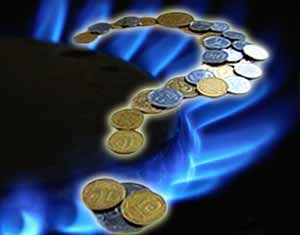15.12.2008
December 11, 2008 (The date of publication in Russian)
Sergey Pravosudov
NAFTOGAZ'S DEFAULT – UKRAINE'S BANKRUPTCY?
The Ukrainian state company's arrearages blast long-term agreement with Moscow
 The political crisis in Ukraine has brought predictable results: the country is currently at the brink of bankruptcy. Hard currency has evaporated from exchange banks, while Naftogaz-Ukraine, the state-owned trading and transporting monopoly, fails to pay the debt for the gas imported from Russia. Meanwhile, President Victor Yushchenko and Prime Minister Yuliya Timoshenko display inability to reach accord in this and other issues. Naftogaz's leadership is rushing about among the authorities, while Russia's Gazprom wonders whom to deal with.
The political crisis in Ukraine has brought predictable results: the country is currently at the brink of bankruptcy. Hard currency has evaporated from exchange banks, while Naftogaz-Ukraine, the state-owned trading and transporting monopoly, fails to pay the debt for the gas imported from Russia. Meanwhile, President Victor Yushchenko and Prime Minister Yuliya Timoshenko display inability to reach accord in this and other issues. Naftogaz's leadership is rushing about among the authorities, while Russia's Gazprom wonders whom to deal with.
The bilateral agreement on relationship in gas delivery was signed by Vladimir Putin and Yuliya Timoshenko on October 2. The document suggested transition to long-term cooperation in gas trade between Gazprom and Naftogaz since January 1, 2009. Gazprom expressed the intentions to sell 7.5 billion cub. m of gas per year to Ukraine's ultimate consumers. The agreement also confirmed a stage-by-stage transition to economically substantiated and politically coordinated market prices for gas, as well as tariffs for transit of gas across Ukraine. The only condition for fulfilling the memorandum was redemption of the aggregate debt for the delivered gas by Kiev.
It is noteworthy that Gazprom assisted its partners in elaborating optimum schemes for returning the debt. In particular, the Russian company mediated with Deutsche Bank AG on subsidizing the Ukrainian partner's economic activity and debt payment. In addition, the Russian side proposed a scheme enabling Naftogaz to pay the debt for expense of the forward payment for transit.
On November 25, after Dmitry Medvedev acknowledged over the debt problem, Gazprom and Naftogaz agreed that by December 1, the debt for the amount of gas, imported in September and the first half of October would be acquitted, and after that, the two sides would continue the talks on implementation of the memorandum's major provisions.
However, Naftogaz-Ukraine failed to redeem the September- October debt. Thus, the conditions for signing a long-term agreement were not provided. By December 2, Naftogaz's overdue debt for three months reached around $2.2 billion.
In accordance with the signed contract, Naftogaz also has to pay for the gas delivered by Rosukrenergo, the specialized intermediate purchasing gas from Turkmenistan. This arrearage comprises $862.3 million. In case the situation does not essentially change, Ukraine's total debt will exceed $3 billion by Christmas.
Gazprom's representatives remind that a direct transition to market conditions Ц unlike the smooth transition provided by the abovementioned memorandum Ц may raise gas prices to the level of $400 per 1000 cub. m.
Thus, the Ukrainian side Ц both on the level of Naftogaz, the Government and the Central Bank Ц has to undertake urgent measures for paying off the overdue debt.
Accumulation of arrears of the state-owned gas company, managing the whole Ukraine's gas transport system, impedes the planned modernization of the pipelines. Meanwhile, the technical condition of the transport system is deteriorating year after year. Despite availability of a long-term agreement and Ukraine's compliance to obligations related to gas export, Russia cannot guarantee the route to European gas consumersfrom technical failures. Thus, reliability of Ukrainian transit is becoming a common problem for Russia and the EU.
As a result of poor state management, aggravated with populism of political rivals, the gas transport system is underinvested and technically exhausted, while the options of foreign management are unavailable: foreigners are prohibited to participate in the shareholder capital, in concessions, management, rent etc.
The panic of Ukrainian officials over the possible transition to a European gas formula since January 1, 20901, is explained with specific tariff policy in Ukraine. Purchasing gas from Rosukrenergo for 179$ per 1000 cub. m, Naftogaz resells it for prices exceeding $320. In case of a new increase of purchase prices, it will be impossible to resell gas to Ukrainian consumers with a margin like that.
Regarding a hard economic situation in Ukraine in case of Naftogaz's bankruptcy, Russia could independently provide direct deliveries to Ukrainian consumers at the domestic market through the existing daughter company Gazprom-Sbyt-Ukraine.
Some Ukrainian officials argue that Ukraine does not owe anything for Russian debts, and that all of these debts are in fact made by the Swiss-based Rosukrenergo. However, Rosukrenergo is not more than an operator delivering the Gazprom-paid gas that guarantees delivery of Gazprom-paid gas from Turkmenistan and further resale to Naftogaz with asymbolic margin. Thus, the current arrearage emerges from Naftogaz's delinquency and not from involvement of Rosukrenergo.
Most probably, in the current situation Ukraine will have to pay for the overdue gas exceptionally with its property, conceding for foundation of a joint Russian-Ukrainian consortium on management of the gas transport system. In fact, Ukraine's powers have drawn the country and its largest state-owned company to the brink of default.
Sergey Pravosudov is the Director of National Energy Institute, Moscow
Number of shows: 1245
 ENG
ENG 

 ENG
ENG 
